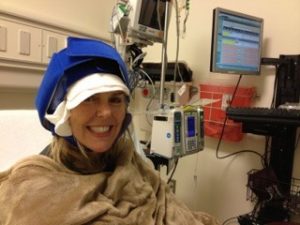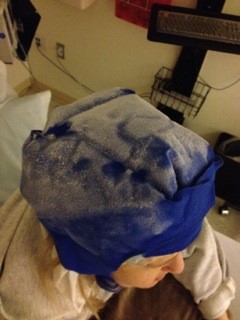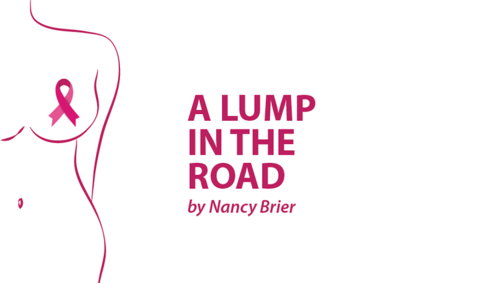We had frozen my head according to the instructions, and it did say that some hair loss was to be expected. But was this giant pile a normal amount?
I looked in the sink again and saw fine blond hair, long stands like floss of sugar nests on deserts in fancy restaurants. It was piled high, almost artfully, against the white porcelain, and I stared, taking it in and rejecting it at the same time.
In my yellow terry cloth robe, I tiptoed downstairs, flipped the kettle on and pulled up the newspaper. “Cancer” was the only word I saw, even though it appeared nowhere on the page. My long hair felt soft against my neck, and I sipped my tea, thinking about what might happen next.
Six weeks earlier my husband, Gary, had found a lump in my right breast, about the size of an almond, distinctive and hard near the surface of the skin. “Feel this,” he said. I put my hand over his fingers, rough, large and manlike against my softer, smaller ones. I grazed the surface of my breast and then cautiously pressed more firmly.
“I’ll call the doctor in the morning.”
Chemo began in January. During the interval, my husband found out about a technique some women are using to save their hair during chemotherapy. It’s an expensive gamble that promises fabulous results. “You’ll feel less sick if you don’t lose your hair,” Gary coaxed. “Your recovery will be faster.”

Almost medieval in its cruelty, the process involves wearing a series of rented caps, frozen to minus 41 degrees celsius, strapped tight to the head with Velcro on chemotherapy days. The hospital staff encouraged me to try it and said that it had worked for others. A young woman had just finished her treatment and walked out with beautiful black hair, they told us, the same hair she had when she started.
We needed four large coolers, 120 pounds of dry ice, a laser thermometer, a timer, gas mask, thick gloves, and 16 expensive caps. None of these items were available in our rural community, so Gary went about procuring them.
“What do you have in there, a liver?” a stranger asked when we arrived at the hospital wheeling our coolers.
Head is frozen, trying to save hair
Nurses had arranged for us to have a private chemo room so we wouldn’t disrupt other patients, and brought us a pile of heated blankets. “You’ll need these,” they said, then showed my husband where they were, for when we needed to restock.
We settled in and my husband got to work. He put a mask on his face and strapped gloves on his hands. Then he reached into the cooler, the noxious mist of dry ice obscuring his face and lending a surreal quality to this bizarre scene. A shiny blue cap frosted white with ice emerged in his gloved hands from the fog, and together we fitted it onto my head, that frozen helmet a shock to my senses.
Every half hour, Gary quickly pulled a cap off my head and replaced it with a fresh, more frozen one, making notes on the paper he had placed on the table. When my scalp was sufficiently frozen, the nurses hooked me up to chemo drugs. My only job was to endure.
The theory is that freezing the scalp prevents blood flow to that area, so chemo meds can’t make it there. I would still lose hair everywhere else, but the top of my head would be normal.
Seven hours later, with the last cap still on my head, we packed up our load and walked to the car. That cap was heavy, my fatigue palpable, and I couldn’t tell if my nausea was from the chemo or the cold. Only another 20 minutes more.
Two weeks later, it was time for another chemo round, and the process started again. This time, my husband had a reaction to the dry ice fumes. My tolerance for the caps was wearing thin. And the cost of renting them, $900 a month plus another $100 for dry ice, weighed on my mind.
Then, almost mercifully, my hair began to fill the sink.
I cleaned the bird’s nest from the porcelain and grabbed three pairs of scissors. My little girl and my loving husband came with me to the backyard, twilight treating us to its final glimmer of pink. There, in the waning of the day, we cut my remaining hair, and in the glorious warmth of sunset, cast my locks to the wind.
Note: Breast Cancer News is strictly a news and information website about the disease. It does not provide medical advice, diagnosis, or treatment. This content is not intended to be a substitute for professional medical advice, diagnosis, or treatment. Always seek the advice of your physician or other qualified health provider with any questions you may have regarding a medical condition. Never disregard professional medical advice or delay in seeking it because of something you have read on this website. The opinions expressed in this column are not those of Breast Cancer News, or its parent company, BioNews Services, and are intended to spark discussion about issues pertaining to breast cancer.


